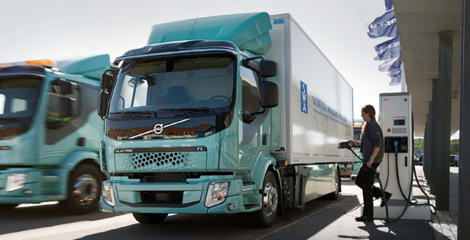Driving change: decarbonising freight for a sustainable future
Adapting our transport systems to low carbon technologies is vital for the future health of the planet. Transport is currently the biggest emitter of carbon and represents 28% of the total emissions, with freight transport accounting for approximately one third of these. The environmental imperative of net zero demands that ways must be found to move heavy freight long distances using a zero carbon energy system.
Research at Heriot-Watt’s Centre for Logistics and Sustainability (CLS) is focused on developing a robust, economically feasible pathway to reducing CO₂ emissions by as much as possible in the shortest period of time. Its work is demonstrating that substantial reductions in CO₂ emissions from road freight can be achieved through a combination of vehicle improvements, changes to logistics operations, and the use of alternative fuels.
A roadmap for transitioning road freight to net zero
To create a roadmap for transition, CLS researchers created a sophisticated mathematical model to describe the UK’s Heavy Goods Vehicles (HGV) operations and used it to evaluate the adoption rate of technical interventions to improve fuel efficiency. Applying the model over a range of scenarios they developed robust evidence for the UK Government’s 5th carbon budget, which subsequently impacted a range of UK freight decarbonisation policies including ‘Freight Carbon Review’, ‘15by25’ and ‘Road to Zero’.
To support the transition pathway, CLS research employed techno-economic modelling to develop robust, firm-centric, electrification strategies that protected competitive advantage. Then the operational impact of using commercial electric vehicles was assessed using large-scale high-fidelity agent-based models. Sensitivity testing ensured that the assessment process was robust, quantifying the trade-offs between service and fleet size, and service levels and charging infrastructure. The modelling and analysis led to the development of a ‘commercial grade’ decarbonisation toolkit.
Impacting UK decarbonisation policies
The CLS research highlighted that there were insufficient financial incentives to reduce carbon emissions from road freight by the necessary levels. This key finding underpinned the evidence provided to a number of key UK Government policies including its crucial 5th carbon budget which runs until 2025. The carbon budget seeks to restrict the amount of Greenhouse Gases (GHG) the UK can emit and the 5th budget aims to limit annual emissions to 57% below 1990 levels by 2032.
In addition, the research provided evidence for the Department for Transport’s (DfT) ‘Freight Carbon Review’ (2017), which considered the future role of alternative fuels and retrofit vehicle technology in reducing both GHG and air pollutant emissions from the road freight sector. These challenges identified from the research are reflected in the DfT’s ‘Road To Zero’ 2018 strategy, which is long term in scope and ambition, considering the drivers of change, opportunities and risks to 2050 and beyond. The interventions outlined in the DfT’s interim programme of carbon reduction for transport, known as the ‘15by25’ and which specifies a carbon emissions reduction target of 15% by 2025, were influenced by the CLS evidence provided for the 5th carbon budget.
The CLS research also informed the UK Government’s ‘Emissions reduction plan’ which sets out how it intends to reduce GHG emissions through the 2020s, and will inform how it will achieve further GHG emissions savings to 2030 and beyond.
Driving sustainability
Through examination of the relationship between energy and logistics systems and consideration of the feasible technologies for the decarbonisation of road freight, the CLS research has not only highlighted the challenges but impacted the configuration of the UK freight system. In particular, the research is influencing the technologies being adopted for urban delivery vehicles and the shift to battery electric vehicles.
Logistics UK (formerly the Freight Transport Association) and the International Road Transport Union (IRU), both of which are heavily involved in setting out how the industry plans to deliver zero emission road freight, have referenced the research, and CLS expertise assisted the development of the IRU’s published roadmap towards fully sustainable truck operations (2017).
Supporting businesses to meet the challenges of freight decarbonisation
Several organisations are collaborating with CLS on strategies to electrify elements of their fleet, with the main collaborator being Waitrose (part of the John Lewis Partnership). CLS research demonstrated that due to charging and range constraints, 20% of deliveries may not meet Waitrose’s current service level commitments. The business impact of this finding was profound, highlighting that to maintain its current service level capability with electric vehicles, Waitrose would require 20% more vehicles and drivers. The research also indicated that more attention needs to be paid to fleet design. These findings have formed an important component of Waitrose’s zero carbon fleet 2045 plan.
More broadly, the CLS decarbonisation toolkit is supporting a range of businesses to assess the operational impact of electrification on store/depot energy demand and of moving from diesel to electric vehicles. It is informing vehicle selection, charging infrastructure specification, and review of electric distribution network constraints, so that businesses can make better decisions in their move to net zero for their freight operations.
Contact
Policy, Strategy and Impact (PSI)
- PSI@hw.ac.uk
Related content

Scotland’s net zero truck fleets need charging points on busy freight routes, report finds
A Heriot-Watt report on vehicle charging points for truck fleets in Scotland, Towards Zero Emission HGV Infrastructure in Scotland, is published today by Transport Scotland.
